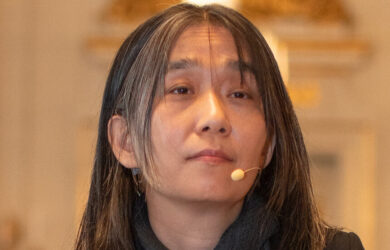Ross Anthony only came to study China by accident, but his research into Xinjiang and the Uyghurs has seen him interviewed by the international media and he now hopes to write a book on the subject for a mainstream readership.
Ross is in his fifth year at Cambridge, having done a masters and taking four years to complete his PhD after spending a year doing fieldwork in China.
Born in Durban, South Africa, he graduated in Art History from the University of Natal in 1998 and was planning to spend a year in northern Pakistan on the border of western China. He had hoped to travel into Afghanistan, but could not get in because of Taliban operations so he travelled into the Xinjiang region of China instead. “I was amazed and soon became obsessed with China and spent all my time reading about it. Here was a civilisation that went back 1,000s of years and I knew nothing about it.”
He returned to South Africa in 2001 to do a masters in English literature at the University of Cape Town, but planned to return to the Far East and eventually got a job teaching in Taiwan.
He says he could see that China’s presence was growing. “A huge social and economic transformation was taking place and it was a fascinating time to be studying China. It also offered lots of potential opportunities,” he says.
In 2005, he was accepted to do an MPhil in Social Anthropology at Cambridge focusing on China and deepened his research for his PhD.
He returned to Xinjiang, the largest province in China, to do his fieldwork. “It looks nothing like the China that you would imagine,” he says. “It has a heavily Central Asian influence. You see people with green eyes, blue eyes, blonde hair, red hair, they speak Turkic and Persian languages and write in Arabic scripts. Traditional oasis architecture is similar to that in the Arabian Peninsula and North Africa. We are not taught how multicultural China is. Xinjiang is a huge province, the largest in China, and, until recently, one seldom read about it in the west. I had heard very little about it before I travelled there. It opened up a massive avenue of inquiry for me.”
His enthusiasm is clear as he talks about the history of the province, of the huge influx of Han Chinese from other parts of China into the region, of what he calls “the unrelenting modernisation” of remote frontier zones as part and parcel of this migration, of the region’s autonomous status which is similar to Tibet and the political repercussions of all of this. “In just a few years the more traditional Central Asian culture has been increasingly replaced with the new modernity of China’s market turn, and that juxtaposition is really interesting,” he says. “The province seized me. It encapsulated my desire for adventure and my academic interest.”
His research in Xinjiang province in 2007/8 was timely. A few months after leaving, the capital of the region, Urumqi, where he had been based, was the scene of one of China’s biggest ethnic riots in the last 10 years. Nearly 200 hundred people were killed and around 1,700 injured. Most of those killed were Han Chinese who had been attacked by Uyghurs. Ross had lived in one of the neighbourhoods where most of the killings happened. He has not been able to return since and says he does not know if any of the friends he made there were killed in the riots.
He says the violence and the repression that followed [exiled Uyghur groups claim up to 800 Uyghurs were killed] was no surprise to anyone who knew the region.
“Government policy has left many locals feeling alienated. It was a very repressive climate, where any form of criticism, even if it was legitimate, was portrayed as being pro-separatist. It was very intimidating. There were a lot of fights in the street, a lot of tension. Many young Uyghur men who had come to Urumqi from the oases towns of the south, were unemployed and disenfranchised,” he says, adding that the repression had increased in anticipation that some groups would use the Beijing Olympics as a platform to air their grievances with the government to the world.
Because of his knowledge of the region, Ross was asked onto Al-Jazeera to give an analysis of what was happening.
Even when he was there he says people, particularly the elites, were wary about speaking of anything vaguely political. It took him a long while to gain people’s trust and to find out about the region and the impact of rapid modernisation, the subject of his thesis. “Technically people can talk about anything they wish, but in reality you have to learn what the limits are as you don’t want to put anyone in danger,” he says. He adds that he did question whether his work was worth it if it put anyone in physical danger.
The repression continues to be tight and the riots were followed in September 2009 by Han Chinese protests after a scare around several Uyghurs who were trying to stab people with hypodermic needles. “Han Chinese often view Uyghurs as unhygienic. The panic that resulted from this incident led eventually to the replacement of the region’s hardline party boss Wang Lequan.”
Ross says he would like to return as he has compiled a detailed study of the neighbourhood where Uyghurs live and wants to see how it is changing in light of political and economic development, for instance, a more moderate governor, Zhang Chunxian, has been installed and Han civil servants coming to the region now have to learn one of the local Xinjiang languages. “It’s an olive branch,” says Ross, “but there needs to be a lot more where that came from. Unfortunately, the authorities have also introduced a new law which makes talking or writing about anything pertaining to independence illegal. The Chinese government view the problems as having been caused by a few separatists whipped up by outsiders, but I would say that the majority of Uyghurs have grievances with the way they are governed, including the way their Islamic culture is being suppressed. Most, however, do not overtly want a separate homeland. This law will only further intimidate Uyghurs airing legitimate grievances which have nothing to do with ethno-separatism.”
Ross hopes to turn his research into a book. “It would be a waste if, as a PhD thesis, just five people read it. I think it is of broader interest,” he says.












